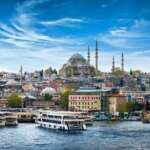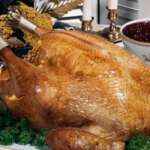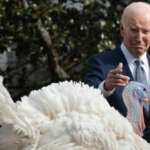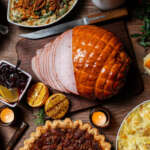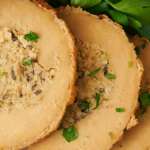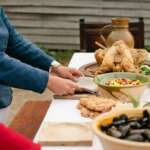A Closer Look at Turkey
Turkey Flag

Turkey Formation Date
October 29, 1923
Turkey Capital Name
The capital of Turkey is Ankara.
Turkey Neighbours
Exploring Turkey
Introduction
Turkey, located at the crossroads of Europe and Asia, is a country steeped in history, culture, and natural beauty. Its strategic location has made it a hub for trade and cultural exchange throughout the centuries. The country's name is derived from the Latin word "Turchia," which means "land of the Turks." As a Cultural Commentator and Travel Writer, I invite you to join me on a journey through this fascinating country.Key Takeaways
- Turkey is a transcontinental country located in both Europe and Asia. - The country's name is derived from the Latin word "Turchia." - Turkey has a rich history, diverse culture, and stunning natural landscapes.Geography
Turkey's geography is diverse, with mountains, valleys, plains, and coastal regions. The Taurus Mountains run through the country, dividing it into different regions. The Black Sea borders the northern coast, while the Mediterranean Sea borders the southern coast. The country is also home to several rivers, including the Tigris and Euphrates. Turkey is rich in natural resources, including coal, iron ore, copper, and oil. It also has fertile land for agriculture, producing crops such as wheat, barley, cotton, and olives. The climate in Turkey varies from region to region but is generally temperate with hot summers and mild winters.Origin and History
Turkey has a long and storied history dating back to ancient civilizations such as the Hittites and the Byzantine Empire. In 1923, after the fall of the Ottoman Empire, Mustafa Kemal Atatürk founded the modern Republic of Turkey. Since then, Turkey has undergone significant political and social changes, becoming a secular nation with a democratic government.Government and Politics
Turkey is a democratic republic with a multi-party political system. The country is divided into 81 provinces, each with its own governor. The government is headed by a president, who is elected by the people for a five-year term. The president appoints a prime minister to lead the government and a council of ministers to assist in governing. Turkey's foreign relations are crucial to its economy and security. The country has strong ties with its neighboring countries and is a member of organizations such as NATO and the United Nations. Turkey also has ongoing geopolitical relationships with countries such as Russia, Iran, and the United States.Commerce and Economy
Turkey's economy is one of the largest in the world, with a diverse range of industries, including agriculture, manufacturing, and tourism. The country's strategic location makes it an important hub for trade between Europe, Asia, and the Middle East. Turkey's currency is the Turkish Lira, which has seen fluctuations in recent years. The country's main exports include textiles, food products, and machinery. Turkey also has a thriving tourism industry, with millions of visitors each year. Its top tourist attractions include historical sites such as the Hagia Sophia and natural wonders like Cappadocia.Demographics
Turkey has a population of over 83 million people, making it one of the most populous countries in the world. The majority of the population is Turkish, but there are also significant Kurdish and other ethnic minority groups. The median age in Turkey is 32 years old, with a relatively young population.Culture
Turkey's culture is a blend of Eastern and Western influences, shaped by its history and location. The country has a vibrant arts scene, with traditional forms such as calligraphy and ceramics still practiced today. Music is also an essential part of Turkish culture, with genres such as folk, classical, and pop being popular. The country is also known for its colorful festivals, traditions, and holidays. One of the most famous festivals is the Whirling Dervishes Festival, where dancers perform a spiritual dance known as Sema. Other important holidays include Ramadan and Republic Day, which celebrates the founding of the modern Turkish Republic.Languages and Religion
The official language of Turkey is Turkish, but there are also several regional dialects spoken throughout the country. Other minority languages include Kurdish, Arabic, and Armenian. The majority of the population is Muslim, with a small percentage of Christians and Jews. Religion plays a significant role in Turkish society, with many religious customs and traditions still practiced today. Mosques are an essential part of the country's landscape, with some of the most stunning examples being the Blue Mosque and the Süleymaniye Mosque.Education and Healthcare Systems
Turkey has made significant strides in education and healthcare in recent years. The country has a compulsory education system for children between the ages of 6-14. The literacy rate in Turkey is over 95%, with a strong emphasis on science and technology education. The healthcare system in Turkey has also seen improvements, with universal healthcare coverage for all citizens. The country has invested in modern medical facilities and public health initiatives to improve the overall health of its population.Sports and Recreation
Sports are an essential part of Turkish culture, with football being the most popular sport in the country. Turkey has several professional football leagues, with some of its teams competing at an international level. Other popular sports include basketball, volleyball, and wrestling. The country's stunning natural landscapes also make it an ideal destination for outdoor activities such as hiking, skiing, and water sports. Turkey has hosted several international sporting events, including the FIFA World Cup and Formula One Grand Prix.Tourism
Turkey is a popular tourist destination, attracting millions of visitors each year. The country has a rich history, with many ancient ruins and historical sites to explore. Some of the top tourist attractions include the Blue Mosque, Pamukkale, and the ancient city of Ephesus. The country also has a diverse range of activities for tourists, from shopping in bustling bazaars to relaxing on stunning beaches. Turkey's infrastructure is well-developed, with modern transportation options such as high-speed trains and domestic flights.Travel Information for Foreign Visitors
If you are planning to visit Turkey, there are a few things you should know before you go. Citizens of most countries require a visa to enter Turkey, which can be obtained online or at the airport upon arrival. It is also essential to research any health and safety precautions before traveling to the country. Turkey has a rich cultural heritage, and it is important to respect local customs and etiquette. For example, it is customary to remove your shoes when entering a mosque or someone's home. The currency used in Turkey is the Turkish Lira, and credit cards are widely accepted in major cities.Quotes
- "Istanbul was Constantinople." - They Might Be Giants - "A Turk is born a soldier." - Mustafa Kemal Atatürk - "The world is my country, all mankind are my brethren, and to do good is my religion." - Mustafa Kemal AtatürkConclusion
Turkey is a country with a rich history, diverse culture, and stunning landscapes. Its strategic location has made it a hub for trade and cultural exchange throughout the centuries. With its modern infrastructure and warm hospitality, Turkey is a must-visit destination for any traveler. As the country continues to develop and grow, it will undoubtedly become an even more popular destination for tourists from all over the world.Turkey Highest Point Name
The highest point in Turkey is Mount Ararat (Agri Dagi), which stands at an elevation of 5,166 meters (16,945 feet) above sea level. The mountain is located near the northwestern city of Ağrı, in the Iğdır Province. It is a dormant volcano located in the Armenian Highlands of Eastern Turkey near the border of Iran and Armenia. Mount Ararat is the national symbol of Turkey and remains an important religious site for Armenians, Kurds, and Turks alike.
Turkey Capital Longitude
Turkey's capital is Ankara and it is located at a longitude of 32.86 and a latitude of 39.93.
Turkey Capital Latitude
Ankara, Turkey; 39.9283° N, 32.8597° E
Turkey Official Languages
The official languages of Turkey are Turkish and Kurdish. The Turkish constitution states that the language of the Turkish Republic is Turkish. Kurdish is an official language in some areas with significant Kurdish populations.
Turkey Ethnic Groups
Turkey is made up of a wide variety of ethnic groups, with 70-75% of the population being Turkish. Other ethnic groups include Kurds (18%), Circassians (3-4%), Arabs (2-3%) and Bosniaks (1-2%), as well as smaller communities of Georgians, Armenians, Greeks and Laz. There is also a large Roma/Gypsy population in some parts of the country. The diversity of Turkey's population means it also hosts a variety of religions, including Islam, Christianity and Judaism.
Turkey Religions
Religious freedom is guaranteed in Turkey under the country’s secular laws. The majority of Turks are Muslim and, officially, 94% of the population are Sunni Muslims. Approximately 4% of the population are Alevis, a heterodox form of Shia Islam unique to Turkey. About 0.26% of people are Christian and another 0.06% follow non-Abrahamic religions. Additionally, 0.2% of the population are non-religious. Turkey is home to a variety of ancient mosques and religious monuments, making it an attractive destination for people of all denominations. Turkey's diverse religious traditions have done much to create a cultural richness in the country.
Turkey Total Area
Total area of Turkey is approximately 783,562 square kilometers (302,535 square miles).
Turkey Land Area
The total land area of Turkey is 783,562 square kilometers (302,535 square miles).
Turkey Water Area
Turkey has a total land area of 783,562 square km and a total water area of 8,220 square km.
Turkey Total Population
As of 2019, the estimated total population of Turkey is 84,339,067.
Turkey Currency Name
The currency of Turkey is the Turkish Lira (TRY).
Turkey Currency Code
The country currency code for Turkey is TRY.
Turkey Currency Symbol
The Turkish currency symbol is TL (Turkish Lira).
Turkey Time Zones
- UTC+03:00
Turkey is officially in the Eastern European Time Zone (EET) which is two hours ahead of Coordinated Universal Time (UTC+02:00). Daylight saving time (DST) is in effect from the last Sunday in March to the last Sunday in October, where clock is shifted forward by one hour. This means during that time, EET is UTC+03:00. In 2021, DST began on Sunday March 28th and will end on Sunday October 31st.
Turkey Calling Code
The country calling code for Turkey is +90
Turkey Internet TLD
www.aveholidays.tr
How to Say "Turkey" In Different Languages?
- Arabic
- تركيا (ar-EG)
- Portuguese
- Turquia (pt-BR)
- Mandarin
- 土耳其 (zh-CN)
- English
- Turkey (en-GB)
- French
- Turquie (fr-FR)
- German
- Türkei (de-DE)
- Hindi
- तुर्की (hi-IN)
- Indonesian
- Turki (id-ID)
- Italian
- Turchia (it-IT)
- Japanese
- トルコ (ja-JP)
- Dutch
- Turkije (nl-NL)
- Polish
- Turcja (pl-PL)
- Portuguese
- Turquia (pt-PT)
- Russian
- Турция (ru-RU)
- Korean
- 터키 (ko-KR)
- Spanish
- Turquía (es-ES)
- Swedish
- Turkiet (sv-SE)
- Traditional Chinese
- 土耳其 (zh-TW)
- Ukrainian
- Туреччина (uk-UA)
Turkey Popular Holidays
- New Year's Day
- 1 Jan
- Youth and Sports Day
- 19 Jan
- Manisa Carnival
- 25 Jan (27 Jan)
- Troy Day
- 27 Feb
- Cité de la Culture and Arts Festival
- 1 Mar (8 Mar)
- International Women's Day
- 8 Mar
- Good Friday
- 30 Mar
- Easter Sunday
- 1 Apr
- Children's Day
- 23 Apr
- Labour and Solidarity Day
- 1 May
- Commemoration of Ataturk, Youth and Sports Day
- 19 May
- Victory Day
- 19 May
- Youth Festival
- 23 May
- Democracy and National Unity Day
- 15 Jul
- Ramadan Feast
- 12 Aug (13 Aug)
- Konca Valley International Music and Arts Festival
- 27 Aug (3 Sep)
- Kartepe International Music Festival
- 4 Sep (6 Sep)
- Inonu Day
- 22 Oct
- Republic Day
- 29 Oct
- Festival of Sacrifice
- 31 Oct (1 Nov)
- Kizkalesi Festival
- 6 Nov (8 Nov)
- Mevlana Festival
- 11 Dec (18 Dec)
- New Year's Eve
- 31 Dec


